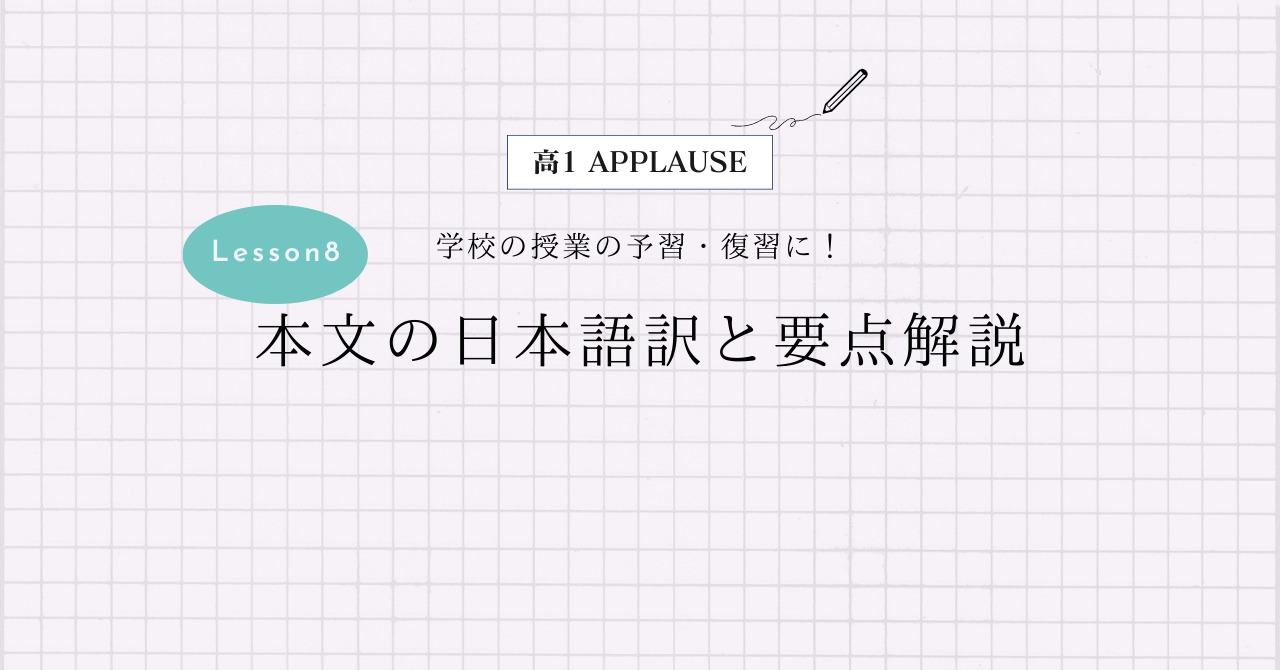開隆堂 高1APPLAUSE Lesson8 Section3の本文の日本語訳と重要箇所の解説です。
Lesson8-1, 8-2, 8-4の解説はこちらからご覧ください。
>高1APPLAUSE Lesson8 Section1 本文和訳
>高1APPLAUSE Lesson8 Section2 本文和訳
>高1APPLAUSE Lesson8 Section4 本文和訳
- APPLAUSE Lesson8 Section3 本文と日本語訳
- APPLAUSE Lesson8 Section3 重要事項の解説
- Mass extinction is a serious problem not only in foreign countries but also in Japan.
- Japan is one of the island countries where there exist many animals and plants we cannot see in other places.
- In fact, 50% of mammals on the land of Japan inhabit only Japan.
- If they disappear from Japan, it also means that they will disappear on earth.
- In 2019, the Ministry of the Environment listed 3,676 kinds of animals and plants as endangered species.
- Some of them are quite familiar to us, for example, Asiatic black bears, storks, sea otters, dugongs, and even killifish.
- The Environment Agency has implemented artificial breeding programs, feeding programs, and so on.
- That’s how we must protect endangered species in our country.
- APPLAUSE Lesson8 Section3 まとめ
APPLAUSE Lesson8 Section3 本文と日本語訳
Mass extinction is a serious problem not only in foreign countries but also in Japan.
「大量絶滅は外国だけでなく日本でも深刻な問題です。」
Japan is one of the island countries where there exist many animals and plants we cannot see in other places.
「日本は,他の場所では見ることができないたくさんの動物と植物が存在する島国の1つです。」
In fact, 50% of mammals on the land of Japan inhabit only Japan.
「実際,日本の陸地にいる哺乳類の50%は日本にしか住んでいません。」
If they disappear from Japan, it also means that they will disappear on earth.
「もし彼らが日本から消えたら,それは彼らが地球上からも消えることを意味します。」
In 2019, the Ministry of the Environment listed 3,676 kinds of animals and plants as endangered species.
「2019年に,環境省は3,676種類の動物と植物を絶滅危惧種として指定しました。」
Some of them are quite familiar to us, for example, Asiatic black bears, storks, sea otters, dugongs, and even killifish.
「そのうちの一部は私たちにとってかなり馴染みがあります。例えばツキノワグマ,コウノトリ,ラッコ,ジュゴン,そしてメダカでさえもです。」
The Environment Agency has implemented artificial breeding programs, feeding programs, and so on.
「環境庁は人工繁殖プログラムや給餌プログラムなどを実施してきています。」
That’s how we must protect endangered species in our country.
「そのようにして,私たちの国で絶滅危惧種を保護しなければならないのです。」

APPLAUSE Lesson8 Section3 重要事項の解説
Mass extinction is a serious problem not only in foreign countries but also in Japan.
“not only A but also B”で「AだけでなくBも」という重要表現です。
“mass”は「大量の」,“serious”は「深刻な,重大な」,“foreign”は「外国の」という形容詞になります。
“extinction”は「絶滅」,“problem”は「問題」という名詞ですね。
Japan is one of the island countries where there exist many animals and plants we cannot see in other places.
“one of 複数名詞”は「名詞のうちの1つ」という表現です。“island”は「島」という名詞ですね。
“where”は「関係副詞」で,“where there exist many animals and plants we cannot see in other places”が先行詞“the island countries”を修飾しています。
元々は“Japan is one of the island countries.”と“there exist many animals and plants we cannot see in other places there.”という2文です。
後半の文の最後の副詞“there”が「関係副詞where」に置き換わっていますね。
“there exist 名詞~”は「~が存在する」という表現で,「there構文」とほとんど同じです。“exist”は「存在する」という動詞になります。
また,“many animals and plants”の後ろには「目的格の関係代名詞」の“that/which”が省略されていて,“we cannot see in other places”が先行詞“many animals and plants”を修飾しています。
In fact, 50% of mammals on the land of Japan inhabit only Japan.
“in fact”は「実際は」という重要表現です。
“mammals”は「哺乳類」という名詞で,“of”は前置詞で,”A of B”の形で「BのA」というように後ろから前に訳します。
“land”は「陸地,土地」という名詞で,“inhabit”は「に住む,生息する」という動詞です。
“only”は「~しか,たった~」といった副詞になります。
If they disappear from Japan, it also means that they will disappear on earth.
この文では「接続詞if」が使われています。
“disappear”は「消える,消滅する」,“mean”は「を意味する」という動詞になります。
“they”は“50% of mammals on the land of Japan”を指していて,“it”は「日本からその動物たちが消えること」を指しています。
“also”は「また,さらに」といった副詞で,付け加える役割があります。色々な文で使うので必ず覚えましょう!
“that”は「接続詞」で,“earth”は「地球」という名詞ですね。
In 2019, the Ministry of the Environment listed 3,676 kinds of animals and plants as endangered species.
“Ministry of the Environment”は「環境省」です。
“list”は「を記載する,リスト化する」といった動詞で,今回は「指定する」と訳しました。
“kind”は「種類」という名詞で,“kind(s) of~”で「~の種類」という重要表現です。
“as”は「~として」という前置詞で,“endangered”は「絶滅の危機に瀕した」といった形容詞になります。
“species”は「(生物分類としての)種」という名詞で,単数形も複数形も同じ形になりますよ。
Some of them are quite familiar to us, for example, Asiatic black bears, storks, sea otters, dugongs, and even killifish.
“some of~”は「~の一部」といった意味で,“them”は“3,676 kinds of animals and plants”を指しています。
“quite”は「かなり,まったく」という副詞,“familiar”は「よく知っている,馴染みがある」という形容詞です。
“be familiar to~”で「~によく知られている」という意味になりますよ。
“even”は「~でさえ」という強調を表す副詞です。
The Environment Agency has implemented artificial breeding programs, feeding programs, and so on.
“Environment Agency”は「環境庁」です。
この文では「現在完了」が使われています。
“implement”は「を実施する,実行する」という動詞で,“artificial”は「人工の」という形容詞,“breeding”は「繁殖」,“feeding”は「給餌」という名詞になります。
“and so on”は「~など」という重要表現ですね。
That’s how we must protect endangered species in our country.
“that’s how 主語 動詞~”で「そのようにして~」という方法を示す表現です。
“how”は「関係副詞」ですが,今回のように先行詞は置いてはいけません。
元々は“That is the way.”と“We must protect endangered species in our country in it.”という2文です。
“in it”が”how”に変わって,そして先行詞”the way”が消えるという形になります。”the way how”とはなりませんよ!
ちなみに「関係代名詞which」を使って,“That’s the way in which we must protect endangered species in our country.”と表現することもあります。
“must”は「~しなければならない」という助動詞で,“protect”は「を保護する,守る」という動詞です。
APPLAUSE Lesson8 Section3 まとめ
以上がAPPLAUSE Lesson8 Section3の日本語訳となります。
「関係副詞」「関係代名詞」などの文の作り方を確認しておきましょう!
>高1APPLAUSE Lesson8 Section1 本文和訳
>高1APPLAUSE Lesson8 Section2 本文和訳
>高1APPLAUSE Lesson8 Section4 本文和訳
何か分からない点や他に解説してほしい点があれば,お気軽にコメントしてください!




コメント